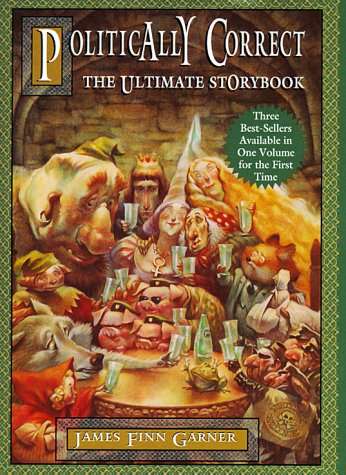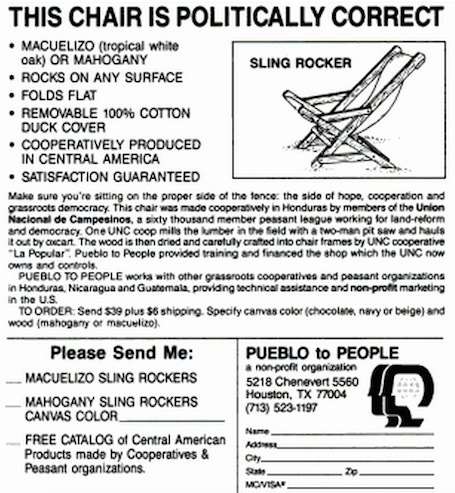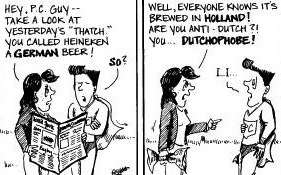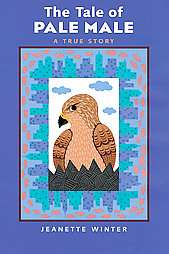What the Hell Does 'Politically Correct' Mean?: A Short History
The many meanings of 'political correctness'

Amanda Taub's Vox piece denying the existence of political correctness does get one thing right: The phrase political correctness "has no actual fixed or specific meaning." What it does have, though Taub doesn't explore this, is a history of meanings: a series of ways different people have deployed the term, often for radically different purposes. Unpack that history, and you can unpack a lot of the debates going on today.
People have been putting the words "politically" and "correct" together in various contexts for ages, but for our purposes the story begins in the middle of the 20th century, as various Marxist-Leninist sects developed a distinctive cant. One of the terms they liked to use was "politically correct," as in "What is needed now is a politically correct, class-conscious and militant leadership, which will lead an armed struggle to abolish the whole system of exploitation of man by man in Indonesia and establish a workers state!" It was a phrase for the sort of radical who was deeply interested in establishing and enforcing the "correct line," to borrow another term of the day. If you were the sort of radical who was not interested in establishing and enforcing the correct line, you were bound to start mocking this way of talking, and by the end of the '60s the mockers were flinging the phrase back at the drones. In 1969, for example, when Dana Beal of the White Panther Party defended the counterculture against its critics on the straight left, he argued that freely experimenting was more important than trying "to be perfectly politically 'correct.'" A year later, in the seminal feminist anthology Sisterhood is Powerful, Robin Morgan derided male editors who had "the best intentions of being politically 'correct'" but couldn't resist butting in with their own ideas. In the new usage, which soon superceded the old Leninist lingo pretty much entirely, "politically correct" was an unkind term for leftists who acted as though good politics were simply a matter of mastering the right jargon.
Meanwhile, a similar but slightly different approach to the phrase emerged. In '80s issues of magazines like Mother Jones or Ms., "politically correct" could describe a consumer good or a lifestyle choice. The tone here was usually lightly self-mocking, as you'd expect when words once associated with a shifting Maoist party line were now being applied to an exercise book or a fake fur. But some people did use it earnestly, perhaps because they weren't in on the joke, perhaps because they just thought the term was too good to go to waste. In the early '90s, a woman told me that she and her friends had often said "politically correct" without any irony when she was an undergraduate at Bryn Mawr. She wasn't happy when she started hearing people use the expression disdainfully.
My favorite mid-'80s manifestation of the phrase has to be this ad that Mother Jones ran in 1985—mostly because I'm not entirely sure if it's being partly ironic or completely sincere. It's clearly one of the funniest things anyone wrote that year, but I'll be damned if I know whether the person who produced it knew that:

By then the term was fairly well-established on American campuses. When future Clinton speechwriter Jeff Shesol debuted his comic strip Thatch in Brown's student newspaper in 1988, he included a faux superhero called Politically Correct Person, a character forever correcting people's language and consumer choices.

The phrase persisted in the more radical segments of the left as well. When I was attending the University of Michigan, one of my colleagues at the student radio station edited a queer/punk zine called P.C. Casualties, which ran this righteous rant in 1991: "As if bullying prank phone calls from those young Republican shitheads weren't enough, now we have half-assed, pseudo-radical academics playing the same old power games as well. Yeah, you've got all the 'correct' answers, and even a little power in your corner of this political ghetto. But you're all fake….All you've managed to do is torture and maim those you really ought to be caring for—your own brothers and sisters. The bodies of P.C. Casualties lay strewn all over, ghosts of dreams too afraid to materialize, and whispers too fearful to make a sound."

That piece was published near the end of the 1990-91 academic year, which also happened to be the year the phrase had its national coming-out party. The December 24, 1990, Newsweek featured the words "THOUGHT POLICE" on its cover; inside, a Jerry Adler article argued that "where the PC reigns, one defies it at one's peril." A month later, John Taylor's cover story "Are You Politically Correct?" appeared in New York magazine. The Wall Street Journal ran a series of pieces attacking political correctness. And around the same time that issue of P.C. Casualties appeared, President George Herbert Walker Bush warned the graduating class at Michigan that "the notion of political correctness" was replacing "old prejudices with new ones."
"Politically correct" had now entered the mainstream lexicon—and, maybe more important, the conservative lexicon. But what did people mean when they said it? When that jeremiad in P.C. Casualties got down to specifics, it invoked "women banned from the Michigan Womyn's Music Festival for practicing S&M." You weren't likely to see that mentioned in a George Will column. So what were the conservatives upset about?
To a large extent, it was the same things critics on the left had been upset about. But there were other complaints here too. While Newsweek's cover story included anecdotes about censorship and other heavy-handed attempts to impose an orthodoxy, it also veered off periodically into discussions of deconstruction, the Great Books canon, and other subjects that didn't have much to do with civil liberties. Taylor's New York story went even further in that direction, including a whole section on Afrocentrism. From 1990 onward, a bunch of longstanding conservative complaints about campus life, particularly its arguments about what was taught in the English departments, were framed as debates about political correctness.

For some on the right, "P.C." began to be a vague way to refer to anything left of center. "Un-P.C.," meanwhile, became a phrase people used to pat themselves on the back, not just on the right but in the culture at large. By proclaiming yourself politically incorrect, you were announcing that you were a brave opponent of stultifying orthodoxies, even if your actual opinions were as vanilla as the Michigan Womyn's Music Festival.
On the left, some people embraced the term defensively (at Michigan, several student groups opened the 1991-92 school year by adopting the slogan "PC and Proud"), while others foreshadowed Taub by declaring political correctness a myth. More recently, it's become common to claim that what conservatives call political correctness is really "just politeness." (And indeed, if someone uneducated in the jargon of the week unwittingly uses the wrong language, he may receive the same reaction he'd get at a society dinner for using the wrong fork. But I don't think that's what they mean.)
So maybe Taub's right; maybe we should drop the phrase from our lexicon. Not because it doesn't describe anything, but because it describes so many things that you can't use it without worrying that people won't understand what you're talking about. But I won't scold you if you use it anyway. I wouldn't want to come across as politically correct.
Bonus links:
1. In 2006, I wrote about the rise of right-wing P.C. The article includes my own attempt to nail down a definition of political correctness: a "political posture…that treats identity politics not just as an ideology but as a trump card, that maintains a rigid orthodoxy while regarding itself as subversive, that uses a series of contrived outrages to feed a bureaucratic machine."
2. Ever wonder what Jonathan Chait had to say about political correctness when he was 19? Wonder no more.


Show Comments (152)